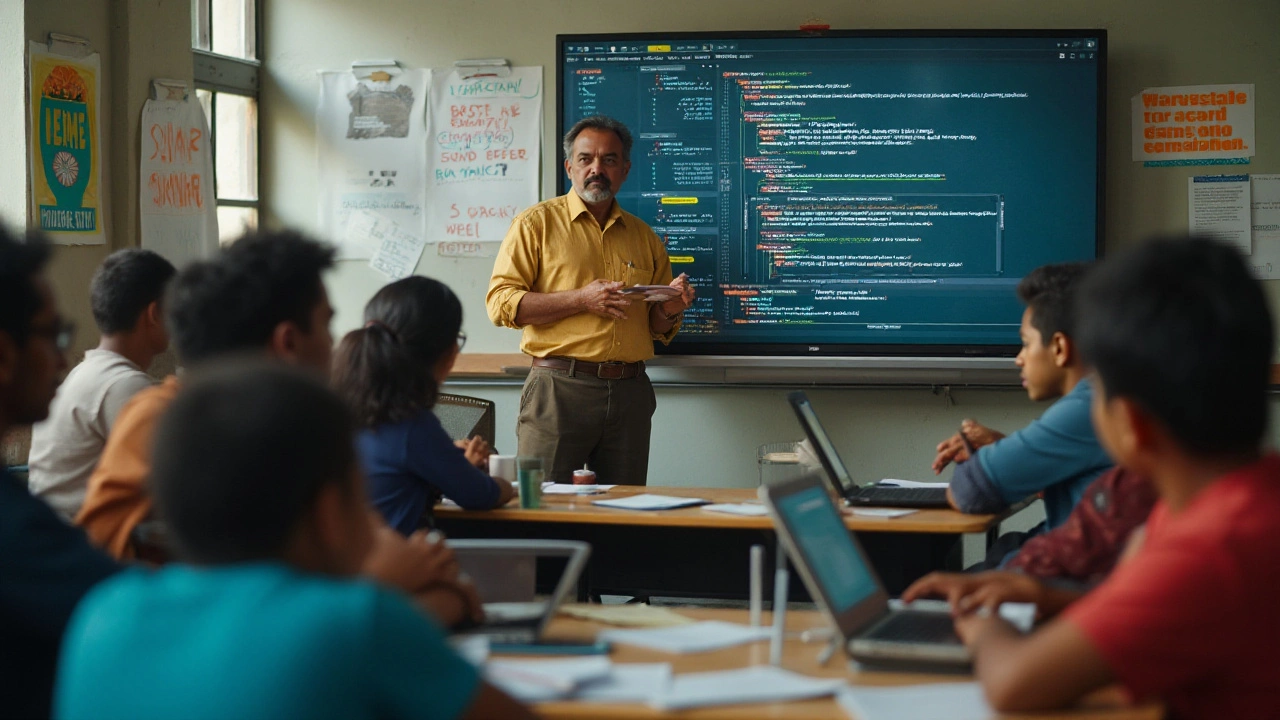Is Learning to Code Difficult for First-Timers?
 Jan, 7 2025
Jan, 7 2025
Dipping a toe into the world of coding can feel a bit like opening a door to another universe. For someone aiming to learn to code, the question often arises: How difficult is it to embark on this journey?
Some might say it's a breeze, while others feel like they're trudging through a quagmire. The truth lies somewhere in between. Your experience will depend on a few key factors, such as your previous knowledge, the resources you choose, and your approach to problem-solving.
In this article, we delve into both the challenges and the triumphs one might encounter as a newbie coder. From selecting your first language to mastering problem-solving techniques, we'll provide practical advice and inspiration to help you on your way.
- Understanding the Challenges
- Choosing the Right Language
- Effective Learning Strategies
- Overcoming Common Obstacles
Understanding the Challenges
Diving into the realm of coding for beginners can seem daunting at first. Many people find themselves wrestling with unfamiliar terminologies and concepts that sound like they're straight out of a sci-fi novel. Variables, loops, and functions could make any newcomer feel like they’re trying to decipher an ancient language. One of the most common initial hurdles is wrapping one's mind around computational thinking, which is the process of breaking down complex problems into more manageable parts. This analytical mindset is crucial not just for learning to code but for problem-solving in general.
The diversity of programming languages available can also be quite overwhelming. With each language presenting its unique syntax and paradigms, beginners might feel like they're choosing from an endless buffet without knowing what's best. For instance, Python is often recommended due to its user-friendly syntax, making it a popular choice for beginners. In contrast, languages like C++ might pose a steeper learning curve due to their complexity. Understanding these differences and matching them with personal interests and goals is vital to ease the learning journey.
Time commitment is another significant challenge. Let's face it, coding isn't something you master overnight. It often requires a consistent effort and a lot of patience, like training Luna, my dog, not to eat my shoes. One might find themselves spending hours debugging or on freeCodeCamp, trying out different examples before something clicks. A critical factor is to celebrate small victories to keep motivated. Rome wasn't built in a day, and neither will one's coding proficiency be.
For many, the fear of failure can be a persistent shadow. It's easy to feel discouraged when you hit a wall, especially as a beginner. Yet, failure in coding is a learning opportunity often disguised as frustration. Embracing these missteps with an experimental mindset is crucial. Bill Gates once said, “Your most unhappy customers are your greatest source of learning.” If you replace 'customers' with 'coding errors', you'll see the wisdom in this approach.
To make the journey a little smoother, it's pivotal to recognize that everyone struggles at first. Many successful programmers struggled just like any beginner. By acknowledging this universal truth, newcomers can find comfort in knowing they are not alone. It's part and parcel of becoming proficient, and what often distinguishes those who succeed from those who don't is resilience. Seeking help through communities, whether online forums or local meetups, can make a world of difference. Humans are inherently social, and as much as coding might seem like a solitary activity, collaboration and discussion often fast-track learning.

Choosing the Right Language
Embarking on the path of coding is reminiscent of setting out on a new culinary adventure. Just as you would carefully select ingredients to suit your palate, picking the appropriate programming language is crucial for crafting a successful coding journey. It's common to feel a bit overwhelmed with the variety of languages available, but let’s break it down so that selecting your first language is as smooth as possible.
One of the most popular languages for beginners is Python. It's like the ‘beginner’s friend’ in the coding community. Why? Its syntax is clear and easy to understand, closely resembling everyday English. Python is used in web development, data analysis, artificial intelligence, and more. Its versatility makes it an excellent choice for those uncertain about which field to specialize in. According to Stack Overflow’s 2023 Developer Survey, Python ranks among the top languages being used professionally. This popularity translates into a trove of resources and a supportive community that can aid in your learning process.
JavaScript is another language worth considering, especially if you're interested in web development. It's known for its application in front-end development but has grown to be a full-stack language thanks to frameworks like Node.js. JavaScript empowers you to create interactive websites, making it a superpower for aspiring web developers. An interesting tidbit is that major websites like Facebook and YouTube are built using JavaScript. This culmination of potential and real-world application is a compelling reason to dip your toes in its waters.
Then there's Java. Despite what some may call an “older” language, Java's robustness makes it stand as a pillar in enterprise-level applications. It's a bit like choosing a trusty old sedan for a road trip—reliable and still in demand. Whether it's finance, building Android applications, or working with large systems, Java continues to hold its ground. This language might initially appear daunting with its verbose nature but rest assured, the skills cultivated while learning Java are transferable and respected industry-wide.
Quickly gaining traction among newbies is Ruby, particularly the Ruby on Rails framework. Known for its emphasis on simplicity and productivity, Ruby is praised for its neat code readability. Ruby on Rails has been used by the likes of Airbnb and Hulu, showcasing its potential despite not being as canonical as Python or JavaScript. Here, a focus on community-driven development has resulted in rich libraries, known as gems, which can accelerate development tremendously.
If you're inclined towards mobile app development, Swift is particularly tailored for iOS. Released by Apple, Swift is known for its safety features and swift execution, earning points for its user-friendly syntactic waters. As mobile continues to dominate tech trends, learning Swift can position you to craft exceptional apps for iPhones and iPads.
Regardless of the language you choose, the key is to immerse yourself passionately. Early exploration can be intimidating but remember learning a programming language is akin to learning a musical instrument. Each line of code flows into the next like notes forming a melody. Lucy Sanders, the CEO of the National Center for Women & Information Technology, once remarked,
"Each language has its rhythm and tone, finding the one that fits you is like discovering your favorite song."With this in mind, don't hesitate to experiment with different languages before settling on one. As you navigate through the spaces of coding, consider which sector inspires you most, whether it’s data analysis, web development, or mobile applications, and let that lead your decision-making process. And remember, much like learning any new skill, patience is a gift you give yourself on this journey.

Effective Learning Strategies
When starting out, it's crucial to adopt effective learning strategies to successfully acquire coding for beginners skills. The first step is to set a clear goal. Why do you want to learn to code? Defining your 'why' gives direction and purpose to your learning path. Whether you're aiming to build websites, develop apps, or understand data science, your goals can shape the way you approach learning.
An often recommended strategy is project-based learning. Instead of just reading books or watching videos, build things. Start with small projects that align with your interests. This hands-on approach helps solidify concepts and keeps you engaged. Moreover, this methodology mimics real-world problem-solving processes, making it easier to apply what you've learned.
To make learning efficient, leverage the vast range of online resources and communities. Websites like freeCodeCamp, Codecademy, and Khan Academy offer structured lessons and coding exercises. Also, don't underestimate the power of joining coding forums and groups. Engaging with a community can provide support, mentorship, and motivation, making the learning process less isolating and more interactive.
"Anyone who has never made a mistake has never tried anything new." – Albert Einstein
Another valuable strategy is deliberate practice and repetition. Set aside regular time to code each day, even if it's just for 30 minutes. Consistency builds fluency in coding languages over time. Break down complex problems into smaller tasks and tackle them one by one. This incremental approach aids in understanding and ensures progress without becoming overwhelming.
Pair Programming
Pair programming is a technique where two programmers work together at one workstation. While one writes the code, the other reviews each line as it is typed. This strategy not only improves code quality but also accelerates learning. The exchange of ideas during pair programming can lead to innovative solutions and a deeper understanding of the coding process. Consider engaging in this practice if you're more of a collaborative learner.
Lastly, take breaks and reflect on what you have learned. Coding can be intense, and it's important to step back and process the information periodically. Use techniques like the Pomodoro Technique to manage your time effectively. Short breaks between focused coding sessions can improve concentration and prevent burnout, ensuring that you're learning efficiently over the long haul.

Overcoming Common Obstacles
Anyone new to the world of coding for beginners will likely encounter a series of shared challenges. The struggle often begins with understanding foreign concepts—variables, loops, and algorithms can seem like a mountain of confusion at the outset. But fear not, these challenges are opportunities in disguise, primed to offer invaluable learning experiences. The trick is to develop resilience and view these hurdles as stepping stones toward mastery. One effective strategy is to break down complex problems into more manageable chunks, taking it one step at a time. Consistent practice, hands-on projects, and guided tutorials can also help demystify these basic building blocks of coding.
Let's face it, selecting the right resources can also be perplexing. With countless books, online coding classes, and tutorials, the sheer volume of information can be overwhelming. It's about choosing quality over quantity. Free platforms such as Codecademy and Coursera offer structured courses that are engaging and informative. They provide the beginner coding tips you need to build a solid foundation before delving deeper into more complex concepts. Remember to verify the credibility of your sources to ensure the information you're relying on is accurate and up-to-date. On your journey, communities like Stack Overflow can also serve as a guiding light, offering support and answering specific coding difficulties you might face.
When coding, encountering bugs and errors is inevitable. Debugging can be a tedious process, but it's a crucial skill for every coder. An excellent way to improve at this is through the trial and error method, gradually analyzing what went wrong. Many experts suggest printing your code on paper and tracing each step as a human might. This not only makes it easier to see where you might have gone astray but also reinforces understanding. Invest time in learning and practicing debugging strategies — tools like breakpoints and logging can make this process more efficient. Coding challenges can be turned into rich learning experiences that strengthen your programming mindset.
Comparison of Learning Approaches
You might wonder how to strike a balance between theory and practice. Learning by doing is a approach acknowledged by many successful coders. Dr. Angela Yu, founder of The App Brewery, puts it succinctly:
"The best way to learn how to code is to solve problems, build projects, and get your hands dirty. Theoretical understanding is important, but application is key in mastering coding."Consequently, aim to apply your newfound knowledge to solve real-world problems. Build small projects that interest you, and gradually you'll find yourself creating solutions with increasing complexity and finesse.
Frustration can rear its head when learning at an inconsistent pace; sometimes it feels like progress is intangible. A standard approach to valuing progression involves setting small, achievable targets on your learning journey. Whether it’s mastering one new concept per day or building a simple application each week, these little victories can bring immense satisfaction and serve as motivation to push forward. Take note of your progress over time to appreciate the efforts that have translated into tangible skills.